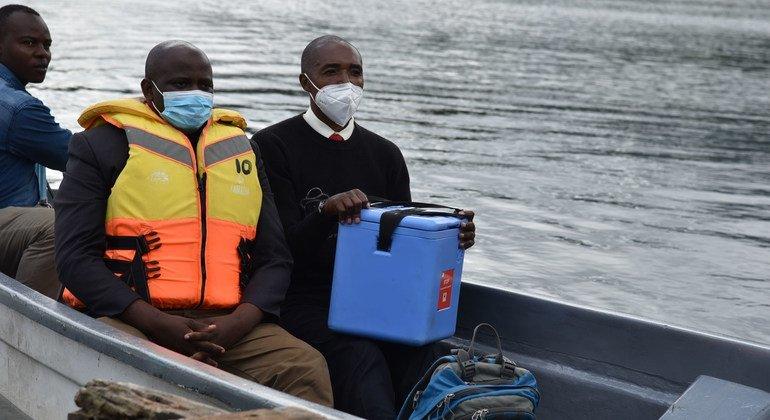Dr. Ibrahim Abubakar, professor of infectious diseases at University College London, issued this warning at a recent meeting of the UN Economic and Social Council (ECOSOC) in New York.
It’s not a question of if, but when and Dr. Abubakar believes that the answer is before than anyone partly desires because the global health system remains drastically silenced.
This is a problem because a pandemic in itself cannot be stopped by a country alone.
“Infectious diseases will not respect boundaries. Therefore, health systems to ensure justice, dignity and universal access must also be agile to implement cross -border policies,” Dr. Abubakar.
On the contrary, stopping pandemics – and promoting wider global development – requires robust partnerships and consistent investments in multilateral systems as a practice, not just an ideal.
“If we are to accommodate the ambitions of the 2030 agenda, we must geneimagine cooperate, not as a transaction action, but as a dynamic, inclusive and future-ready partnership,” said Lok Bahadur Thapa, vice president of Ecosoc.
A goal of uniting all goals
The high-level political forum (HLPF) on sustainable development convenes the UN headquarters in New York to discuss the progress or lack of DEM-over for the globally agreed 17 Sustainable Development goals (SDGs).
The first 16 SDGs deal with specific aspects of development – such as poverty, gender equality and climate change – but the 17th makes a way to achieve the others. And this path lies in embracing global partnerships between state governments, civil society organizations, societies and the private sector.
But with an annual financing gap for the SDGs exceeding $ 4 trillion, the partnerships today are not sufficient to realize the goals for tomorrow.
“We must forge truly transformative partnerships that break traditional silos: governments, civil society, the private sector and multilateral institutions have all roles to play in an inclusive coalition for sustainable development,” said DIMA Al-Khatib, director of the UN Office of South South Collaboration (UNOSSC) at an HLPF event.
Prioritize prevention, not reaction
Right now, the current health system that includes pandemic readiness is oriented to stop health emergencies when they emerge as opposed to proactively preventing them, according to Dr. Abubakar.
Member States recently adopted a treaty on pandemic prevention that strives to do just that – limits the likelihood of future pandemics.
But too many, this emphasis on prevention extends beyond pandemics for issues such as rehabilitation services and primary care, which both experts say are critical investments not only in human well -being but also in peace and security.
In addition, these types of preventative medicine are cheaper than reactive medicine, according to Mandeep Dhaliwal, the director of Health at the UN Development Program (UNDP).
“It’s important to invest in prevention as much as it is in treatment, and it’s more cost -effective because … you turn off the tap,” said Ms. Dhaliwal.
However, convincing investors to support preventative care can be difficult because when they are done properly, they are tangible results not necessarily visible.
Health is in each system
Nevertheless, investment in preventative medicine such as primary care and the socio -economic determinants of health – such as climate and nutrition – can help ensure that health systems holistically support people before a crisis begins.
“Health is not a silo … The factors that affect health are often outside the health sector,” said Mrs. Dhaliwal, referring to the example of air pollution, which is a climate problem that inherently affects health.
This kind of holistic investment requires robust partnerships working to ensure that any initiative – no matter how seemingly distanced – is considering health consequences.
“We’ve all too often treated [health] As a downstream question is something that is only improved if other systems work. But we now understand that health and well -being are not just the result of good development. That’s the starting point, ”said Tony Ott, professor of agricultural science at Pennsylvania State University.
The weak link in the health system
Migrants and displaced people tend to be among the least likely to have access to preventative medicine and often those most affected by the social determinants of health.
“Migration and displacement, whether driven by conflict, climate change or financial factors, defines factors in terms of our health,” he said.
By the end of 2024, 123.2 million people by force were displaced worldwide, a decade-high number, proving that in the 10 years since the SDGs were adopted, the world has been regressed from shifts.
For Dr. Abubakar embodies these displaced people and the millions of more voluntary migrants-why the health system simply cannot continue to silo itself and instead have to embrace cross-border partnerships.
“Health systems must ensure access to important services regardless of immigration status … Any community without access is the weak link that can mean that we are all not protected,” Dr. Abubakar and referred to the next pandemic.
Society at the center
The idea of partnerships as basic to achieving SDGS is logical for many people. After all, goals are universal and require global cooperation.
But this collaboration, especially for health, has to do more than just engage experts – it must engage the people seeking healthcare. Dr. Abubakar said that all health policies must be culturally suitable for local contexts, something that can only happen if society is located at the center of health care.
“The new future that I see would embrace the global partnership, including countries regardless of income level, public and private sector, academic and civil society. And within this framework, society must be at the center … not only as recipients, but as co -creators of solutions.”



